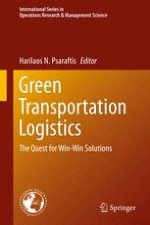2016 | OriginalPaper | Buchkapitel
5. Benchmarking the SuperGreen Corridors with Green Technologies
verfasst von : Chara Georgopoulou, Nikolaos M. P. Kakalis, Valerio Recagno, Sara Fozza
Erschienen in: Green Transportation Logistics
Aktivieren Sie unsere intelligente Suche, um passende Fachinhalte oder Patente zu finden.
Wählen Sie Textabschnitte aus um mit Künstlicher Intelligenz passenden Patente zu finden. powered by
Markieren Sie Textabschnitte, um KI-gestützt weitere passende Inhalte zu finden. powered by
